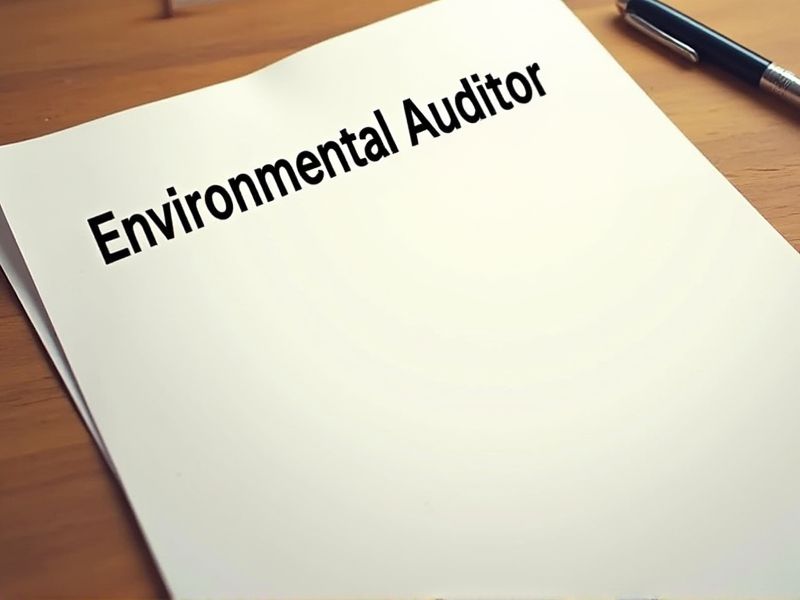
Environmental Auditors assess compliance with environmental regulations and standards, ensuring organizations minimize their ecological impact. Certifications validate their expertise, equipping them with the knowledge to identify and mitigate risks efficiently. Certain certifications enhance credibility, indicating proficiency in evolving environmental laws and sustainable practices. Key certifications required for an Environmental Auditor include those related to environmental management systems and safety.
ISO 14001 Lead Auditor Certification
Obtaining the ISO 14001 Lead Auditor Certification enhances the credibility of an environmental auditor, leading to increased trust from clients and stakeholders. Certification provides a comprehensive understanding of environmental management systems, which improves the auditor's ability to identify gaps and recommend effective solutions. The certification ensures the auditor is aligned with international standards, increasing their capability to conduct audits across diverse industries. Achieving this certification often results in better career advancement opportunities and higher earning potential for environmental auditors.
Certified Environmental Auditor (CEA)
The Certified Environmental Auditor (CEA) credential ensures that an individual has the necessary skills and knowledge to effectively evaluate and report on environmental performance. This certification provides organizations with a reliable measure of the auditor's expertise, thus enhancing trust in the auditing process. Due to increasing regulatory requirements and public scrutiny, organizations need competent auditors to identify compliance gaps and mitigate environmental risks. With a CEA-certified auditor, organizations can more confidently address potential liabilities and improve sustainability strategies.
NEBOSH Environmental Management Certificate
Obtaining the NEBOSH Environmental Management Certificate equips environmental auditors with essential knowledge of environmental management principles, enhancing their ability to identify and assess environmental risks effectively. The certification demonstrates a solid understanding of global environmental issues and legislation, crucial for auditors tasked with ensuring organizational compliance. It strengthens an auditor's capability to recommend sustainable environmental practices based on recognized standards, increasing an organization's operational efficiency and environmental responsibility. The qualification often becomes a critical factor in career advancement opportunities within the environmental sector, making auditors more competitive in the job market.
OSHA Environmental Compliance Certification
Environmental auditors need the OSHA Environmental Compliance Certification to ensure they understand and can evaluate workplace safety standards effectively. This certification enables auditors to accurately identify potential environmental hazards and compliance gaps within organizations. By having this certification, auditors can provide credible assessments that align with legal and regulatory requirements. It also enhances their expertise, increasing confidence in their evaluations and recommendations regarding environmental and workplace safety issues.
Certified Hazardous Materials Manager (CHMM)
Having a Certified Hazardous Materials Manager (CHMM) ensures adherence to environmental regulations, as these professionals are well-versed in compliance standards. Their expertise aids in accurately assessing potential environmental risks, thereby safeguarding public health. They identify and categorize hazardous substances, which is crucial for an environmental audit's integrity. Employing a CHMM facilitates the development of effective mitigation strategies, reducing environmental liabilities for organizations.
LEED Accredited Professional
A LEED Accredited Professional possesses a deep understanding of sustainable building practices, which enhances an environmental auditor's ability to assess compliance with green standards. Their expertise in energy efficiency and environmental design directly contributes to identifying areas for improvement in buildings and operations. This specialized knowledge aids in recommending sustainable practices that align with environmental regulations. The credibility of a LEED Accredited Professional often facilitates greater trust from stakeholders in the audit outcomes.
Certified Safety Auditor (CSA)
A Certified Safety Auditor (CSA) enhances the effectiveness of an environmental auditor by ensuring compliance with health and safety regulations during environmental assessments. The presence of a CSA mitigates risks by identifying potential safety hazards that could impact both the environment and personnel. Their expertise in safety protocols assists in preventing costly legal liabilities associated with non-compliance or workplace accidents. Employing a CSA consequently promotes a culture of safety and operational excellence within environmental auditing processes.
Environmental Management System (EMS) Auditor Certification
Environmental Management System (EMS) Auditor Certification is essential because it validates the auditor's expertise in assessing and improving environmental practices. Certified auditors help organizations comply with regulatory requirements, reducing potential legal and financial penalties. The certification fosters trust among stakeholders, assuring them of the company's commitment to sustainability. Effective auditing leads to identifying inefficiencies, helping companies reduce waste and enhance resource conservation.
Certified Sustainability Professional
Possessing the Certified Sustainability Professional credential equips an Environmental Auditor with a comprehensive understanding of sustainable practices. This knowledge enables the auditor to effectively evaluate and recommend improvements for reducing environmental impact. Companies increasingly seek sustainable operations, making auditors with this expertise more valuable. This certification ensures the auditor stays updated with current environmental regulations and trends, ensuring accurate assessments.
ESG Auditor Certification
The rise in corporate sustainability initiatives drives the demand for ESG Auditor Certification to ensure auditors possess the necessary expertise. Environmental auditors face complex regulations that require structured guidelines offered by certification programs. Investor and stakeholder pressures necessitate rigorous assessments of environmental, social, and governance factors, elevating the importance of certified knowledge. The credibility and assurance provided by certified ESG auditors enhance organizational transparency and accountability.
Summary
You gain credibility and trust when obtaining certifications as an Environmental Auditor. This often leads to a competitive advantage in securing contracts with organizations seeking compliance and sustainability. Certified auditors can expect increased job opportunities due to the growing demand for environmentally responsible practices. Certifications also enhance your skillset, ultimately allowing you to conduct more thorough and effective audits.
